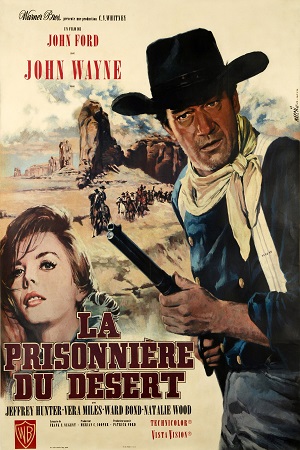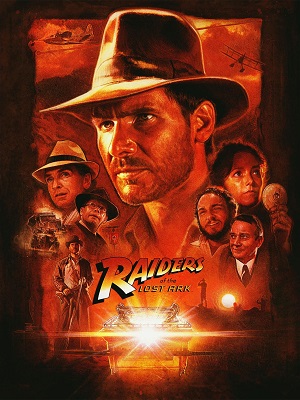The Searchers (1956)

The Searchers is a classic 1956 Western film directed by John Ford and starring John Wayne, Jeffrey Hunter, and Natalie Wood. The film is based on Alan Le May's 1954 novel of the same name and is widely regarded as one of the greatest Western films ever made. The Searchers is known for its stunning cinematography, complex characters, and exploration of themes such as racism, obsession, and the impact of violence.
Set in the aftermath of the American Civil War, The Searchers follows the story of Ethan Edwards (John Wayne), a Confederate veteran who embarks on a five-year quest to rescue his niece Debbie (Natalie Wood) from the Comanche tribe who abducted her. The film is renowned for its portrayal of the psychological and emotional toll that such a relentless pursuit can take on an individual, as well as its exploration of the complexities of human nature.
One of the most striking aspects of The Searchers is its cinematography, which was groundbreaking for its time and continues to be celebrated today. Director John Ford and cinematographer Winton C. Hoch utilized the vast and visually stunning landscapes of Monument Valley, Utah, to create a sense of epic grandeur and isolation. The film's use of wide shots and expansive vistas not only captured the beauty of the American West but also emphasized the characters' smallness in the face of nature's immensity.
The character of Ethan Edwards, portrayed by John Wayne, is central to the film's exploration of complex themes. Ethan is a deeply flawed and morally ambiguous protagonist whose relentless pursuit of Debbie raises questions about his motivations and morality. His attitudes towards Native Americans, particularly his intense hatred towards the Comanche, reflect the racial tensions of the era and add layers of complexity to his character. The film delves into the darker aspects of Ethan's personality, presenting him as a deeply conflicted and troubled individual whose actions are driven by a potent mix of love, hatred, and obsession.
The Searchers also addresses issues of racism and prejudice, particularly in its depiction of Native American characters. The film provides a nuanced portrayal of the Comanche people, depicting them not as mere villains but as individuals with their own culture, traditions, and motivations. This approach was groundbreaking for its time and challenged traditional Western stereotypes by presenting a more multifaceted representation of Native American characters.
In addition to its exploration of complex themes and its stunning visuals, The Searchers is also celebrated for its powerful performances. John Wayne delivers a career-defining performance as Ethan Edwards, portraying the character's inner turmoil and moral ambiguity with depth and nuance. Jeffrey Hunter's portrayal of Martin Pawley, a part-Cherokee companion to Ethan, provides a counterbalance to Ethan's character and adds further layers of complexity to the film's exploration of race and identity.
Natalie Wood's portrayal of Debbie, who undergoes a profound transformation during her years with the Comanche, is poignant and emotionally resonant. Her character's internal struggle between her two identities – her original upbringing as a white girl and her assimilation into Comanche culture – adds depth to the film's examination of cultural identity and belonging.
The Searchers' impact on popular culture and the Western genre cannot be overstated. Its influence can be seen in subsequent films, television shows, and literature, with many filmmakers citing it as a source of inspiration. The film's exploration of complex characters, moral ambiguity, and psychological depth set a new standard for the Western genre and elevated it beyond mere tales of heroism and villainy.
In conclusion, The Searchers is a timeless classic that continues to resonate with audiences decades after its initial release. Its exploration of complex themes, stunning cinematography, and powerful performances have solidified its status as one of the greatest Western films ever made. The film's willingness to confront issues of racism, obsession, and the impact of violence sets it apart as a work of enduring relevance and importance in the history of cinema.
Related News
The Top 10 Best Western Movies of All Time
The Western genre has been a staple of cinema for decades, capturing the imaginations of audiences with its tales of rugged landscapes, daring outlaws, and fearless lawmen. From classic showdowns to sweeping vistas, Western movies have left an indelible mark on the cinematic landscape. Here, we pres
The Top 10 Best Disney Animated Movies
Disney has a rich history of creating timeless animated movies that have captured the hearts of audiences around the world. From classic tales to modern adventures, Disney has consistently delivered top-quality animated films. Here is a curated list of the top 10 best Disney animated movies that hav
The Iron Giant (1999)
"The Iron Giant" is a 1999 animated science fiction film directed by Brad Bird. The film is based on the 1968 novel "The Iron Man" by Ted Hughes. Set in the 1950s during the height of the Cold War, the story follows a young boy named Hogarth Hughes who discovers and befriends a g
10 Best Films Starring Leonardo DiCaprio
Leonardo DiCaprio is one of the most talented and versatile actors of his generation, who has starred in a wide range of genres, from romance to thriller, from drama to comedy, from biopic to sci-fi. He has worked with some of the most acclaimed directors, such as Martin Scorsese, Christopher Nolan,




Comment Record:
Reply to comments: